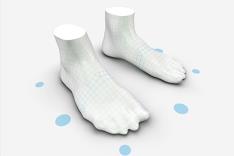
For years, the mantra "take 10,000 steps a day" has been touted as a benchmark for a healthy and active lifestyle. Fitbit, Apple Watch, and various fitness apps have ingrained this target into our minds, encouraging us to achieve this seemingly magical number. But is it truly the gold standard for health and fitness, or is it just another well-intentioned myth? In this article, we'll explore the origins of the 10,000-step goal, its potential benefits, and whether it's the right fit for everyone.
The Origins of the 10,000-Step Goal
The concept of taking 10,000 steps a day can be traced back to Japan in the 1960s. Dr. Yoshiro Hatano, a Japanese researcher, invented the first pedometer, known as the "manpo-kei," which translates to "10,000 steps meter." Dr. Hatano's research suggested that walking 10,000 steps daily could help maintain a healthy lifestyle and prevent various health issues.
Potential Benefits of Taking 10,000 Steps
1. Cardiovascular Health: Walking regularly can improve cardiovascular fitness, lower blood pressure, and reduce the risk of heart disease.
2. Weight Management: Walking burns calories, making it an effective tool for weight management when combined with a balanced diet.
3. Mental Health: Physical activity, including walking, has been linked to reduced stress, anxiety, and improved mood.
4. Improved Mobility: Regular walking can enhance joint mobility and reduce the risk of age-related mobility issues.
5. Accessibility: Walking is a low-impact exercise that is accessible to nearly everyone, regardless of age or fitness level.
Is 10,000 Steps for Everyone?
While 10,000 steps can be a helpful guideline for some individuals, it may not be suitable for everyone. Here are some considerations:
1. Individual Goals: Your activity level should align with your specific health and fitness goals. If you're looking to maintain weight or improve cardiovascular health, 10,000 steps may be suitable. However, other goals may require different exercise regimens.
2. Fitness Level: If you're new to exercise or have physical limitations, starting with a lower step goal and gradually increasing it may be more manageable and sustainable.
3. Quality vs. Quantity: The quality of your steps matters. Brisk walking and other forms of exercise may provide more benefits in less time compared to simply reaching a step count.
4. Variety of Activities: Incorporating a variety of physical activities, such as strength training, flexibility exercises, and aerobic workouts, can offer a more well-rounded fitness routine.
Conclusion
While striving for 10,000 steps a day can be a motivating goal for some, it's important to remember that the number alone doesn't guarantee optimal health. The quality of your physical activity, individual goals, and overall fitness level should guide your exercise routine. Instead of fixating on a specific step count, focus on staying active in ways that you enjoy and that align with your personal health objectives. Ultimately, it's the consistency and variety of your physical activity that will lead to a healthier, more balanced life.
Click Here For The Latest Deals in Walking Shoes From Amazon
By clicking on the product links in this article, we may receive a commission fee at no cost to you, the reader. Sponsorships and affiliate commissions help support our research so we can help you find the best products. Read full affiliate disclosure here.
Why Trust Us?
ACTIVE.com's editorial team relies on the knowledge and experience of fitness and wellness experts including competitive athletes, coaches, physical therapists, nutritionists, and certified trainers. This helps us ensure the products we feature are of the highest standard. Collectively, the team has spent countless hours researching equipment, gear, and recovery tools in order to create the most accurate, authentic content for our readers. Customer satisfaction is also a key part of our review process, which is why we only feature products that are highly rated.






Discuss This Article